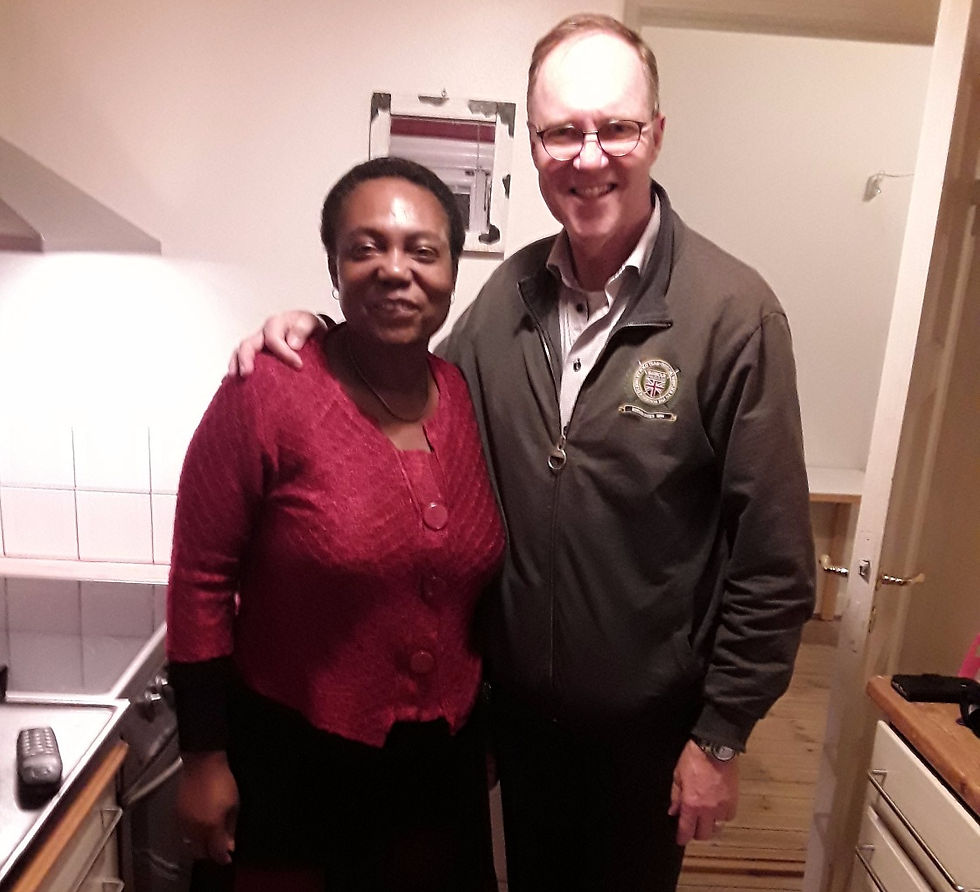Changing face of Sweden
- Yvonne Osafo
- Nov 14, 2016
- 4 min read
Day 6 in Sweden - Thursday 10th November 2016
A changing population
After a lovely afternoon and evening with Anna Malmquist and Camilla yesterday, we had the pleasure of meeting Anna's husband over drinks at the end of the day. He works as a teacher in Kista, where we were staying, and we arranged to meet him today to look around the school. After catching up with admin we set off to the school.
We were surprised to see that very few Swedish pupils attend this school because the local population has changed so dramatically over the past few years. Videos of the local shopping mall show that only four years ago there was a very Swedish population but today there is a very diverse clientelle.
Sweden has very generously thrown wide her borders to those seeking asylum and the impact on the Swedish way of life is yet to be fully seen. If the Galleria is an indication of a level of integration, the school indicates how difficult it is for the many cultures to truly mix.
Sweden is known for her excellence with regard to childcare from the cradle onwards. This seems to have had a positive impact on the mental health of the nation and the general sense of well being. This has not been the case for the new and diverse population, many of whom have been exposed to severe trauma. How will this impact the national picture and is there the capacity to meet the new and complex needs?
Dr Bjorn Solomonsson
In the evening it's time to meet Dr Bjorn Solomonsson, who was my very first contact in Sweden just over a year ago. Bjorn's books and articles have inspired me throughout my training so I was grateful that he set aside time to see me despite a very busy schedule.

We followed Bjorn's very detailed directions to his clinic and settled down to chat over tea and pastries. He explained modestly how he tries to combine at least four tasks in life; psychoanalyst, perinatal consultant, researcher and grandfather. I'm aware that he is a writer and that he also has appointments around the world, and somehow he manages to fit them all in.
Bjorn explained how the Swedish health system, which is one of the world’s best systems, is organized. The care is excellent and well covered. In the first year of life in Stockholm 96% of women attend the perinatal clinics. Up until 10 years ago each clinic had its own psychologist, which worked very well; however, things have now changed due to the institution of big child psychiatry units, which have an increased focus on disorders such as ADHD and autism, and a decreasing focus on infant mental health and early intervention. The interactive perspective of the work with families is also diminishing in preference for medication, and this is a concern, not just for Bjorn but for all the professionals I have met in Sweden. Like Bjorn, these excellent and highly skilled clinicians enjoy thriving clinics, which they describe as enjoyable and satisfying. However, with the change in focus over the past 10 years and the withdrawal of psychologists from the child health clinics, there is a concern that the skills associated with treating the parent infant relationship will not be easily passed on to the next generation of therapists. This is a concern and a dilemma for professionals such as Bjorn.
There is therefore a very big responsibility on the shoulders of very few skilled professionals, to transfer their skills through training. The concern is that there is not a specific training for parent infant psychotherapists in Sweden and the current specialists are either retired or too busy. The government has not yet woken up to the urgent need to bridge the gap between physical and mental well being in chaging and diverse population.
Despite this dilemma, Sweden still boasts an excellent child care system, which gives every child the best psysical care at the start of life. This no doubt contributes to mental health, however, the gap in psychological health is becoming more visible.
I will go into more detail about this in my final report. This heart to heart chat with Bjorn he confirmed to me that our system in Croydon Best Start Parent Infant Partnership is a good model that is effective around the world. As a result of our chat Bjorn feels confirmed and challenged to pursue his desire to think about how to address the need to train the next generation of therapists.
We had a very good rapport and hopefully we will be able to continue to share ideas and good practice across our borders.
Day 7 in Sweden - Friday 11th November 2016
My hosts for today were both unwell (perhaps the sudden severe turn of the weather has contributed to this) so the day was spent exploring the centre of Stockholm and preparing for our flight to Norway over the weekend.
Next blog... Goodbye Sweden - Hello Norway

























Comments